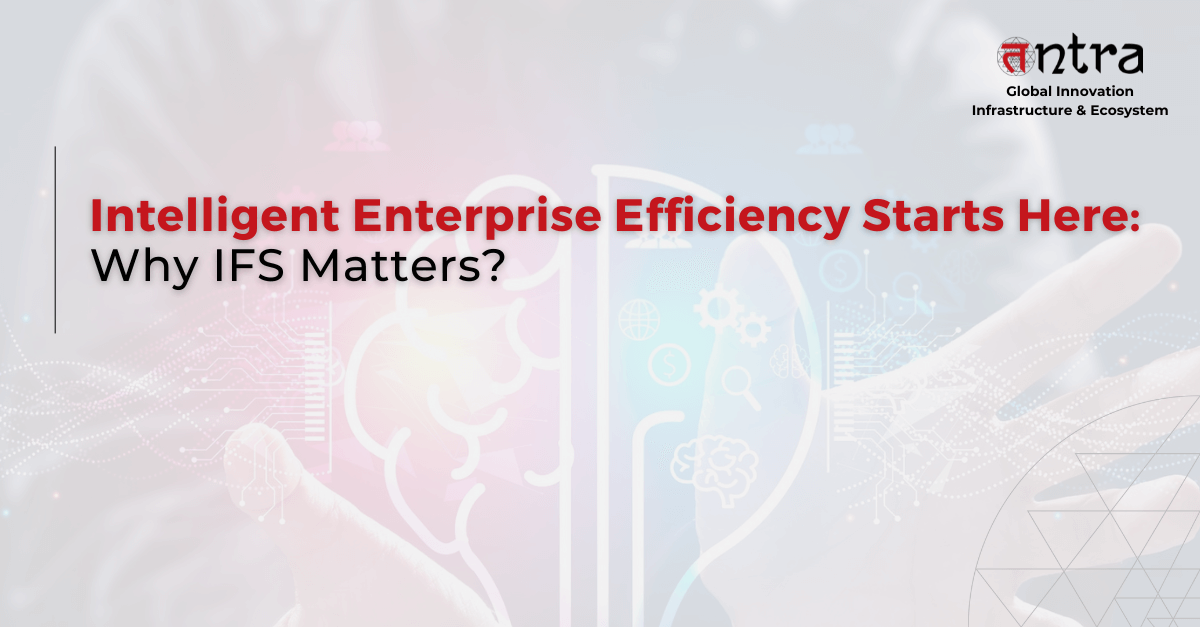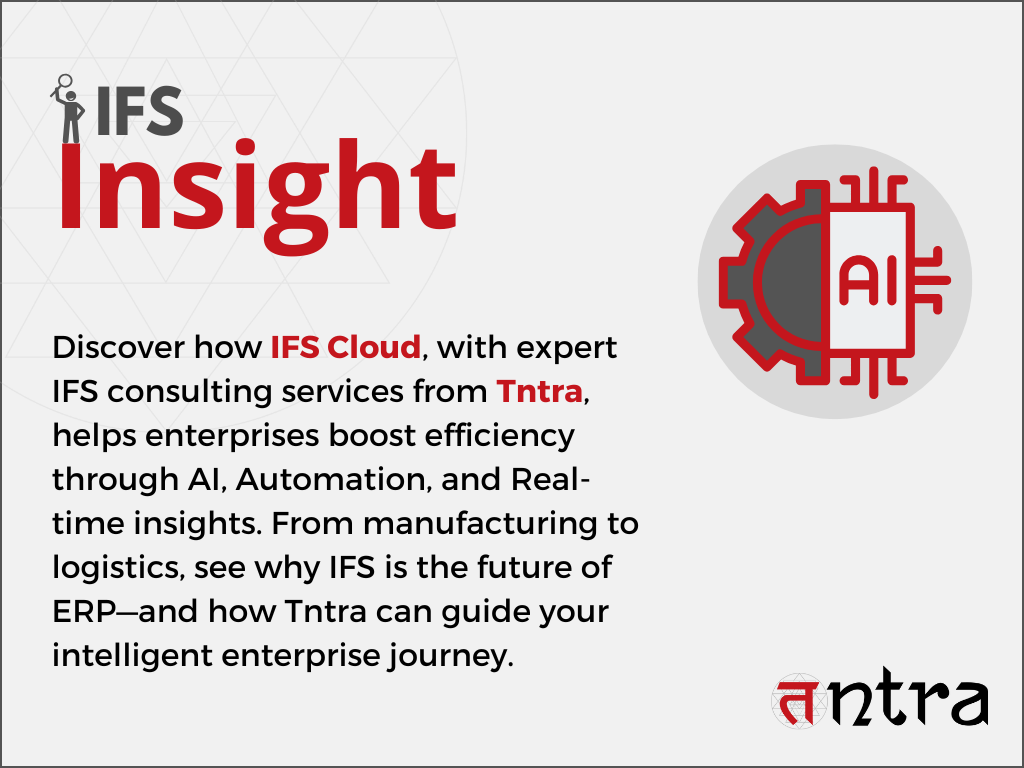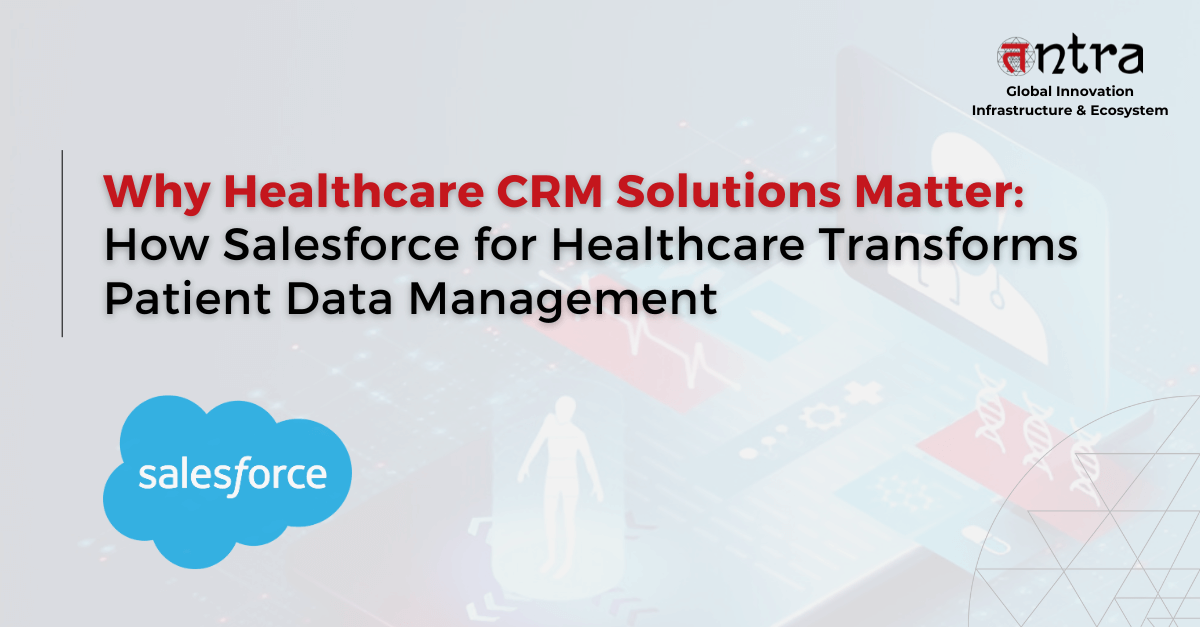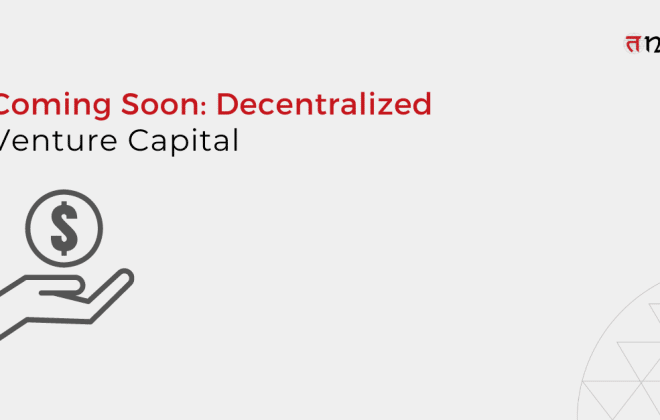
Intelligent Enterprise Efficiency Starts Here: Why IFS Matters
Table of Contents
ToggleThis blog explores why IFS Cloud is at the forefront of intelligent enterprise efficiency. It breaks down what sets IFS apart from traditional ERP systems, how it drives real-time agility, and where it delivers the most value—from manufacturing to project-based industries. With the support of expert IFS consulting services, organizations can unlock the full potential of IFS Cloud by aligning it with strategic goals and operational needs. Learn how IFS Cloud combines AI, IoT, and automation for smarter operations, and why the right IFS consulting partner is key to successful implementation. If you’re aiming to modernize your ERP and scale smartly, this read is essential. Continue reading to learn more.

Enterprise efficiency isn’t just about doing things faster anymore. It’s about making them smarter. Enter the intelligent enterprise – where real-time data, automation, cloud agility, and intuitive decision-making shape how business gets done. It’s not just a buzzword anymore; it’s the new standard.
But here’s the thing: to become an intelligent enterprise, you need more than vision. You need the right tools. And that’s exactly where IFS Cloud steps in.
If you’ve been wondering why IFS matters in this era of high-speed innovation and rapid digital transformation, you’re not alone. More and more organizations are waking up to the potential of this powerful platform. So, why are forward-thinking enterprises increasingly leaning into IFS Cloud to run their business? Let’s dive deep and unpack the “why” behind the IFS revolution.
What is IFS and Why It’s Different from Traditional ERP?
Let’s start with the basics. What is IFS Cloud?
IFS stands for Industrial and Financial Systems, and it’s been quietly – and now loudly – redefining what ERP (Enterprise Resource Planning) can look like. Unlike the rigid, one-size-fits-none ERPs of the past, IFS ERP is tailor-made for industries that need more than just a spreadsheet on steroids.
A Quick Flashback
Founded in 1983, IFS started in Sweden with a laser focus on industries like manufacturing, construction, and utilities. Over the years, it evolved – from traditional software to a highly flexible, cloud-native suite now known as IFS Cloud.
And IFS Cloud is not just ERP. It’s a full-scale, integrated suite combining enterprise asset management (EAM), field service management (FSM), and project management – all tightly woven into a single platform. This is not your grandfather’s ERP.
Why Enterprises Choose IFS
Let’s be honest: most traditional ERP systems feel like wearing a wool sweater in summer – bulky, itchy, and not designed for today’s agile needs.
So, why do enterprises choose IFS?
- IFS software is industry-specific, not generic.
- It’s agile, scalable, and built for complex operations.
- And perhaps most importantly, IFS Cloud is modular – meaning you only use what you need, when you need it.
The Intelligent Enterprise: A Shift from Reactive to Proactive
Gone are the days of firefighting. The modern intelligent enterprise doesn’t just respond – it anticipates. Think of it like moving from a basic thermometer to a full-blown smart thermostat that adjusts your climate based on behavior, season, and usage patterns.
But how do you get there?
Cloud. Data. Automation.
These aren’t just buzzwords. They’re the backbone of enterprise agility and digital transformation. And legacy systems? They simply can’t keep up.
Traditional ERPs were never built to handle real-time data streaming, IoT device integration, or AI-powered forecasting. That’s where IFS Cloud becomes a game-changer. It’s not just helping companies run – it’s helping them think.
So, how does IFS improve efficiency? By giving you a 360-degree view of your operations, intelligently automating routine tasks, and freeing up your people to focus on what actually moves the needle.
Why IFS Matters: Key Benefits Driving Enterprise Efficiency
If you’re wondering whether IFS is really worth the hype, let’s talk benefits – the tangible, numbers-backed, game-changing ones.
- Real-Time Visibility Across Departments
Imagine every team – from operations to finance to field service – working off the same data, in real-time. No more siloed systems or version mismatches. That’s the IFS way.
- Agile and Scalable Architecture
Whether you’re a mid-sized manufacturer or a global energy provider, IFS grows with you. Start small, scale fast.
- Built-In Industry Capabilities
Unlike generalist ERP platforms, IFS solutions are built with deep domain knowledge. We’re talking IFS for manufacturing, asset management, oil and gas, logistics, utilities, and project-centric businesses.
- Embedded Intelligence (AI, ML, IoT)
Smarter decision-making is baked right in. Predict maintenance, optimize resource allocation, and automate workflows – all powered by integrated AI and machine learning.
So when we talk about enterprise efficiency, IFS Cloud isn’t just a tool – it’s a transformation engine.
Use Cases: Where IFS Delivers the Most Value
Now let’s get specific. Where exactly does IFS shine?
IFS for Manufacturing
Need real-time shop floor visibility? Integrated supply chain orchestration? IFS delivers it all, helping manufacturers minimize waste, optimize output, and reduce lead times.
IFS for Asset Management
For asset-intensive industries, IFS provides total lifecycle management – from procurement to decommissioning. Perfect for utilities, energy, and infrastructure.
IFS in Logistics, Aerospace, and Oil & Gas
With complex project lifecycles and compliance-heavy environments, industries like aerospace and oil & gas need more than off-the-shelf ERP. IFS brings the specificity these sectors demand.
IFS for Project-Based Organizations
Organizations that run on projects – think engineering firms, defense contractors, or construction companies – love how IFS handles resource planning, budgeting, and execution in a seamless interface.
Whether it’s ERP for logistics, IFS for manufacturing, or project-centric ERP, the use cases are as diverse as the industries it serves.
IFS Cloud in Action: Real-World Results and Metrics
Alright, let’s talk numbers – because that’s what matters to decision-makers.
Here are some real-world outcomes companies have experienced post-IFS implementation:
- 30% increase in productivity due to workflow automation.
- 25% reduction in downtime for asset-intensive operations.
- 50% faster project delivery in engineering firms.
- 20% cost savings within the first year of deployment.
From SMBs scaling operations globally to large enterprises consolidating fragmented systems, the results speak volumes.
And yes – the platform is powerful enough for global enterprises yet flexible enough for mid-sized businesses. That’s the beauty of IFS Cloud.
How to Get Started with IFS: Consulting and Implementation
So, you’re sold on the idea. Now what?
This is where the rubber meets the road – implementation. And spoiler alert: choosing the right partner is half the battle.
Why IFS Consulting Services Matter
Not every organization has in-house expertise to fully leverage the power of IFS. That’s where IFS consulting services come in – helping you plan, deploy, and optimize the entire suite.
Look for the Best IFS Implementation Partners
Seek out IFS consulting companies that:
- Understand your industry.
- Offer certified IFS services.
- Have proven experience with IFS Applications.
- Can guide change management and training.
The goal isn’t just to implement the software – it’s to maximize its impact. Look for a trusted software engineering partner who can also support customization, upgrades, and ongoing innovation.
A great software product engineering company can elevate your IFS implementation from functional to exceptional.
Conclusion: Intelligent Enterprise Efficiency Starts with IFS
Let’s recap.
If you’re serious about becoming an intelligent enterprise, if you’re looking to break free from the limits of traditional ERP, and if you want scalable, industry-specific tools that actually work – then yes, IFS matters.
From cloud-native flexibility to embedded AI, from real-time visibility to deep industry alignment, IFS (Industrial and Financial Systems) isn’t just keeping pace with the future – it’s building it.
So whether you’re exploring IFS enterprise software solutions, need guidance from IFS consulting companies, or are looking for IFS Cloud services from a trusted software engineering partner, your journey starts with asking the right question:
What do you want your enterprise to become?
If the answer is smarter, faster, and future-ready – then it’s time to explore IFS Cloud solutions and tap into the power of IFS Applications backed by the best software product engineering solutions in the business.
Ready to get started?
Talk to our experts. Whether you’re exploring options, planning a transition, or scaling up, we’re here to help you unlock intelligent enterprise efficiency with IFS.
Let’s build the future, intelligently. Schedule a call today!
FAQs
What is the Objective of Intelligent Enterprise?
The goal of an intelligent enterprise is to leverage data, automation, and AI to make smarter, faster decisions that drive efficiency and innovation across the organization.
What is an Intelligent Enterprise System?
It’s a tech-enabled system that integrates cloud computing, real-time data, machine learning, and ERP to proactively manage business operations and customer outcomes.
What is Intelligent Enterprise in SAP?
SAP’s Intelligent Enterprise is a strategy that combines SAP Cloud Platform, AI, analytics, and IoT with SAP ERP to enable real-time decision-making and agility.
How can Organizations become Intelligent Enterprises through SAP Solutions?
By adopting SAP S/4HANA, SAP BTP, and industry-specific tools, organizations can digitize processes, automate tasks, and gain predictive insights for strategic growth.
What are the Advantages of Working with a top IFS Partner?
Leading IFS partners provide expert guidance, faster implementation, tailored solutions, and ongoing support to ensure your IFS investment delivers maximum value.
How much does IFS ERP Implementation Cost?
Costs vary based on organization size, complexity, and customization needs. Small projects may start at $100K, while large-scale rollouts can exceed $1M.





